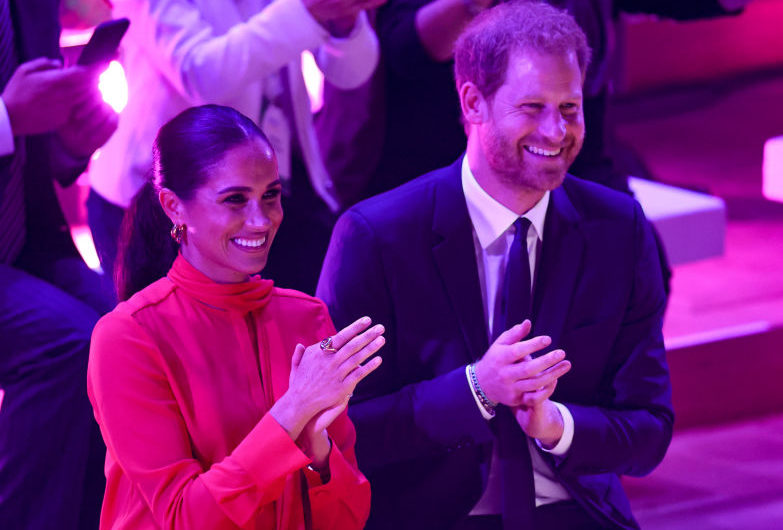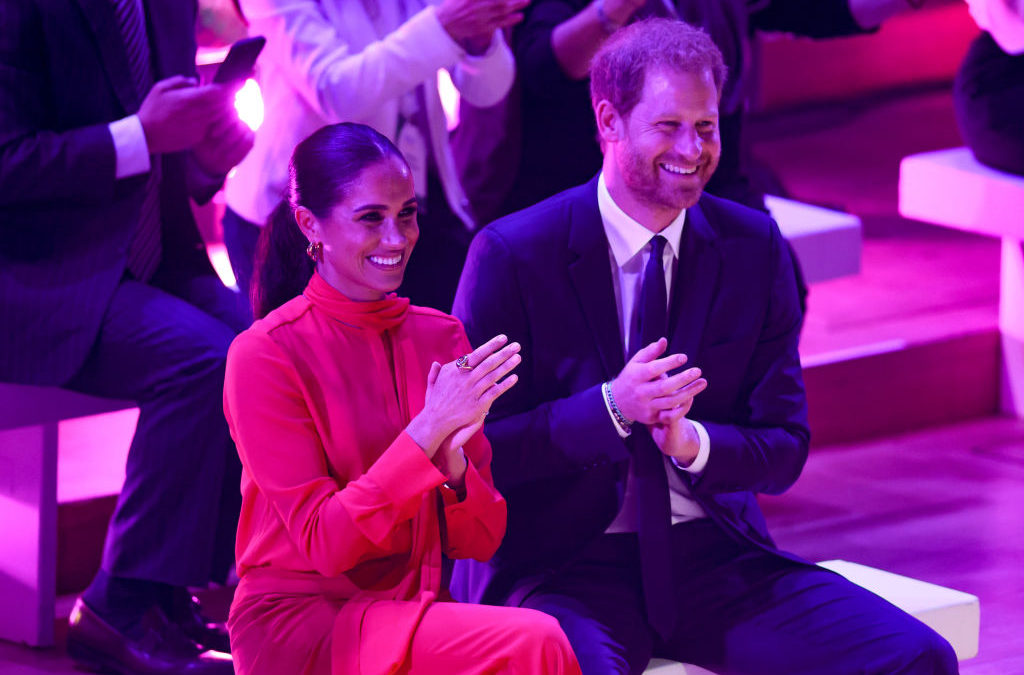The Invictus Backlash: Another Reason Harry And Meghan Will Likely Never Return To The UK
WORDS: Aaliyah Harry

One thing is becoming ever clearer with each passing incident – when it comes to Prince Harry and Meghan Markle, they’re dammed if they do and dammed if they don’t. As Prince Harry’s documentary Heart of Invictus (a documentary highlighting the work of the Prince’s once much-lauded Invictus Games) was released on Netflix yesterday, the couple received a barrage of criticism. Seeing the reaction, it’s easy to wonder – what could Harry and Meghan ever do that would make their UK-based critics happy?
Prince Harry launched the Invictus Games in 2014 and was credited with creating a life-changing community for wounded, injured, and sick servicemen and women. In a speech launching the 2018 Games in Sydney, Harry proudly said: ‘From my life-changing flight back from the battlefields of Afghanistan to the example of America’s warrior games, Invictus was inspired by the experiences I had alongside our servicemen and women from many nations. These Games were created for our men and women in uniform; designed around their talents and their needs; and built not just for them, but also for the friends and families that have supported their recoveries and had their lives changed forever.’
Now, five years on, we’re living in a very different, post-Megxit world, and Prince Harry’s detractors were ready to pounce on Thursday morning, when they released their latest Netflix documentary. As has been widely publicised, in September 2020 the couple signed a multi-year deal with Netflix, rumoured to be worth as much as $150 million. It’s understood some of those funds will be redirected to The Invictus Games Foundation, which is the subject of their latest project with the streaming platform.
‘Five years on, we’re living in a post-Megxit world, and Prince Harry’s detractors were ready to pounce.’
Despite using his global platform to spotlight these brave veterans and their stories, like clockwork, hatred towards Harry started to spread in the UK quickly.
GB News featured Royal Biographer Angela Levin during their Royal round-up segment, where she stated that although Prince Harry was once well liked for the Invictus Games, things have now changed.
She claimed: ‘People in Canada have contacted me because they’re trying to stop the 2025 Games because they don’t want it to be linked to them [Prince Harry and Meghan Markle] anymore. They don’t want it because it’s become about Harry and Meghan – they’re taking all the spotlight away from them [the veterans.]’
One UK columnist wrote: ‘Prince Harry’s decision to talk about himself instead of the brave wounded servicemen left me with a bitter taste in my mouth.’
Scores of articles sprung up dedicated to ‘fact-checking’ (read: disproving) Harry’s every personal utterance in the show. And social media became swamped with attacks on the couple.
‘Like clockwork, hatred towards Harry started to spread in the UK quickly.’
The changing reaction around Harry’s Invictus work is a clear example with which to view the changing attitudes of people to him. Before Prince Harry was married to Meghan Markle, he was hailed a hero for starting the Invictus games. The prince was plastered all over front-pages of the newspapers and he was applauded.
Now, he is accused of ‘taking the spotlight’. These accusations stem from Prince Harry sharing his struggles with mental health during the documentary. Whilst talking about post-traumatic stress disorder, Harry says that his return from Afghanistan in 2012 triggered emotions that he suppressed after the death of his mother, Princess Diana, when he was just 12 years old. The prince, whose troubles with the royal family have been well-chronicled, said the impact of Diana’s death was never discussed.
Prince Harry admitted, ‘Losing my mum at such a young age, the trauma I had I was never aware of. It was never discussed, and I didn’t really talk about it, and I suppressed it like most other youngsters would have done. When it all came fizzing out, I was bouncing off the walls – what is going on here? – I am now feeling everything instead of being young.’
He then spoke about the lack of support he received from his family after he returned from Afghanistan. He revealed: ‘The biggest struggle for me was no one around me really could help. I didn’t have that support structure, that network or that expert advice to identify what was actually going on with me.’
‘Losing my mum at such a young age, the trauma I had I was never aware of.’
After Harry spoke about his lack of support from his family, some viewers took to social media to claim that he ‘lied’ about it. One viewer took to X (formerly Twitter) and wrote: ‘Prince Harry lied AGAIN. I’m so sick of the fake victim narrative from him.’
After reading the criticism, it’s clear that many people are ignoring why he chose to voice this on-screen. The reason Prince Harry shared his story was to emphasise his point about the importance of needing a strong support system and community through trauma and grief. Through voicing how the lack of support from his family negatively impacted his mental health, it only reinforces why he created the Invictus Games so the veterans and their families wouldn’t suffer the same fate.
Watching Prince Harry open up about his mental health struggles in the media isn’t new. He has bravely spoke about his experiences for a number of years – even previously co-founding the Heads Together Campaign in 2016 alongside the Prince and Princess of Wales. The campaign encouraged people to have important conversations about mental health. And if we cast our minds back, the Royal trio were all praised for starting this initiative back then. Now suddenly, Prince Harry sharing his struggles and personal stories about his mental health is ‘taking the spotlight from others.’ The shift in attitude towards him is clear.
If you really watch the documentary in full, there are a number of incredible voices and stories highlighted – and Prince Harry’s is miniscule in comparison. If anything, by drawing so much negative attention to Prince Harry, people are actually themselves drowning out the inspiring voices of the veterans.
It’s also so brave for anyone to share their experiences of mental health – royalty or not. Allowing people access to your deepest thoughts during a time when you were at your most vulnerable should always be received with grace. To ridicule or accuse anyone of ‘lying’ and therefore invalidating their struggle with mental health is vile. Critics should also remember that Prince Harry was only 12 years old when Princess Diana died. For many people in this country, that image of a boy solemnly walking behind his mother’s coffin during a procession to Westminster Abbey will never be forgotten. To invalidate his feelings during that time is to also invalidate that little boy, and that will never be right.
‘To ridicule or accuse anyone of “lying” and therefore invalidating their struggle with mental health is vile’
For some, it is shocking to see how a charitable deed has been twisted and sparked such vitriol and hatred here in the UK. As one supporter wrote on social media: ‘The lie that Prince Harry has made himself and Megan Markle the sole focus of Invictus Games documentary comes from 1) wanting to diminish the tremendous value of the games 2) the jealousy people have for their successful humanitarian work. The focus is on the vets.’
It’s also interesting to see the difference in the couple’s treatment in the UK and the US where they have made their home. The US has very much embraced the couple’s ability to highlight veterans on such an international scale.
Variety Magazine focused on the couple’s understanding that sometimes fame is needed to bring attention to a worth cause and how ‘The Heart of Invictus’ uses Prince Harry to tell a bigger story. They also interviewed the Producer from Heart of Invictus, Joanna Natasegara, who said: ‘For us, Prince Harry’s commitment to the Invictus community was very clear, and very obvious. He is in and of that community — and so you see that within the show. I don’t mind how people are attracted to the show, but I really hope they take away what we took away, which was a universal message of hope and resilience.’
CNN praised Prince Harry for using his celebrity status to champion the games and drew parallels to the Obamas’ Netflix deal for their similar ‘educational output.’ Their review said: ‘Enter “Heart of Invictus,” a clear passion project for Prince Harry, who plays a prominent role in the five-part production alongside individual stories culled from the more than 500 athletes representing 17 countries who took part in the 2022 games at The Hague in the Netherlands.
The review ends: ‘It’s easy to sound cynical about celebrities lending their names to such noble undertakings, and considerably harder to maintain that posture listening to the athletes from around the world discuss the games’ importance to them and their families, embracing its message of resilience and hope.’ Adding: ‘It’s hard to question that it’s heart is in the right place.’
After seeing such absurd backlash over such an empowering charitable event – would it be any wonder if the couple never wanted to leave Montecito? From the glimpses we’ve seen, the couple seem to have carved a peaceful life for themselves in California. It begs the question, who would want to leave a calm, accepting environment to return to the belly of the beast in the UK? It’s now been almost a year since the death of Queen Elizabeth II, and it seems less than likely that the Royal couple will ever return to Britain’s shores in a meaningful way – but after the unnecessary hatred over the Heart of Invictus, who could blame them?
IMAGE: Getty

